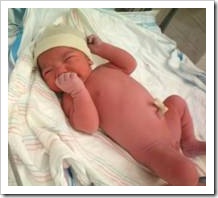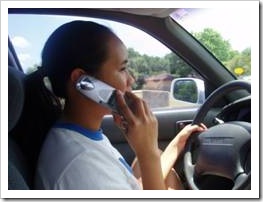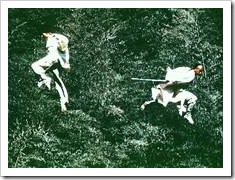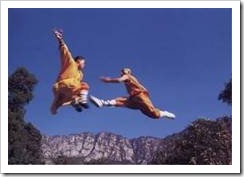 Human beings are formed united with the universe, unaware of dangers, evils or even simple discomforts. Then, the warm water is gone, there is a bright light, a blend of strong sounds, pulling and shaking. This is the beginning of realizing we may need to protect ourselves from what is outside of us, i.e. the rest of the world.
Human beings are formed united with the universe, unaware of dangers, evils or even simple discomforts. Then, the warm water is gone, there is a bright light, a blend of strong sounds, pulling and shaking. This is the beginning of realizing we may need to protect ourselves from what is outside of us, i.e. the rest of the world.
It is not that the world is necessarily bad, but there is a chance parts of it might be bad for us. It is not that we are uncomfortable all the time, but in-between comforts, we learn to fill our time with concerns about when the next pain or problem might hit us and what it might be.
So we find ourselves in a familiar enough situation – waiting in line at the bank, driving on the road, entering a busy car park or going to the doctor – and our protective mind kicks in and starts to imagine the worst case scenario.
“What if I have to wait longer than my lunch break? I won’t have time to eat, I’ll have to run back to work and I’ll be late for the very important meeting right after lunch. I’m going to look like an idiot!”
 “This driver beside me is talking on the phone. If she doesn’t pay attention to the road, she might cross into my lane and then we’ll have an accident. This is so dangerous and irresponsible!”
“This driver beside me is talking on the phone. If she doesn’t pay attention to the road, she might cross into my lane and then we’ll have an accident. This is so dangerous and irresponsible!”
“No way am I finding a parking space here at this hour. Now I’ll have to drive around for ages looking for a place to park. If I don’t find a spot in half an hour, the stores will close and then what?”
“This headache is killing me. I’m sure the doctor will find something wrong with my head. Oh, my God, what if it’s cancer? What will my poor kids do without a father?”
Of course, more often than not, a minute later, another teller starts servicing the lunchtime clientele and the line clears quickly, the phone call ends with no accident, a car backs out of a parking space just in front of us and the doctor says we need to drink more water and the pain will go away.
If you have ever seen a Hong Kong action flick with those flying avatars, you have a pretty good idea of how our minds operate.
Two Chinese sages sit quietly with their eyes closed.
 Then, they start flying in the air, swords drawn and robes waving, jumping over buildings and across landscapes, fighting each other fiercely. They are very quick and very clever, but they anticipate each others’ moves, so the fight continues. “Our” hero grows nearly desperate, but then realizes where the other is weak (we know, because we can hear him/her talking themselves through the realization). They move, they strike and the fight is over.
Then, they start flying in the air, swords drawn and robes waving, jumping over buildings and across landscapes, fighting each other fiercely. They are very quick and very clever, but they anticipate each others’ moves, so the fight continues. “Our” hero grows nearly desperate, but then realizes where the other is weak (we know, because we can hear him/her talking themselves through the realization). They move, they strike and the fight is over.
The sages open their eyes, one smiling, the other accepting defeat.
In our mind, the dueling avatars are the evil lord “Worst Case” and the mighty benevolent hero “Most Likely”. “Worst Case” is cunning and resourceful. He boasts years of experience and many victories. “Most Likely” is friendly and pleasant and often seems too sheepish to win the battle, but he is our hero and his triumph is also ours.
You see, whenever “Worst Case” wins, we open our eyes accepting defeat in real life. We feel weakened, battered and hopeless. But when “Most Likely” wins, we open our eyes with a smile, confident that life will probably be good and kind to us.
 Human beings also act out their beliefs. When we perceive something to be difficult, we can find many things in it we cannot do and have a hard time detecting those we can do easily. When something seems scary to us, its teeth and eyes and ears appear so big, we see a wolf instead of Grandmother.
Human beings also act out their beliefs. When we perceive something to be difficult, we can find many things in it we cannot do and have a hard time detecting those we can do easily. When something seems scary to us, its teeth and eyes and ears appear so big, we see a wolf instead of Grandmother.
This what “Worst Case” does to us, you see. When we imagine the worst case scenario in any given situation, we actually help it come true through our behavior. We act rudely towards a person who “couldn’t possibly be friendly to us” and thus lose a potential friend. We overlook what can help us succeed in something that is “just too hard” and thus miss opportunities to shine.
Luckily, our hero is always there to protect us. Whenever our imagination drifts towards the worst case scenario, we can call in the greatest warrior on our side, “Most Likely”. We can do this by asking, “This may be the worst case scenario, but what is most likely to happen?”
 “Most Likely” helps us remember other times at the bank during lunch break, driving home safely, quickly finding a spot to park and our mother’s admonitions, “Always drink a lot of water or you’ll get a headache”.
“Most Likely” helps us remember other times at the bank during lunch break, driving home safely, quickly finding a spot to park and our mother’s admonitions, “Always drink a lot of water or you’ll get a headache”.
Of course, if “Most Likely” needs some help, you can always summon his sister (I had to throw a woman sage in there somewhere, just to be fair), “Best Case”. “Best Case” is so pleasant, she will remind us of the really good times when we are “in the flow” and everything happens just the way we like it. She soothes our spirit and so brings out the absolute best in us.
So who you gonna call?
Happy life,
Gal











